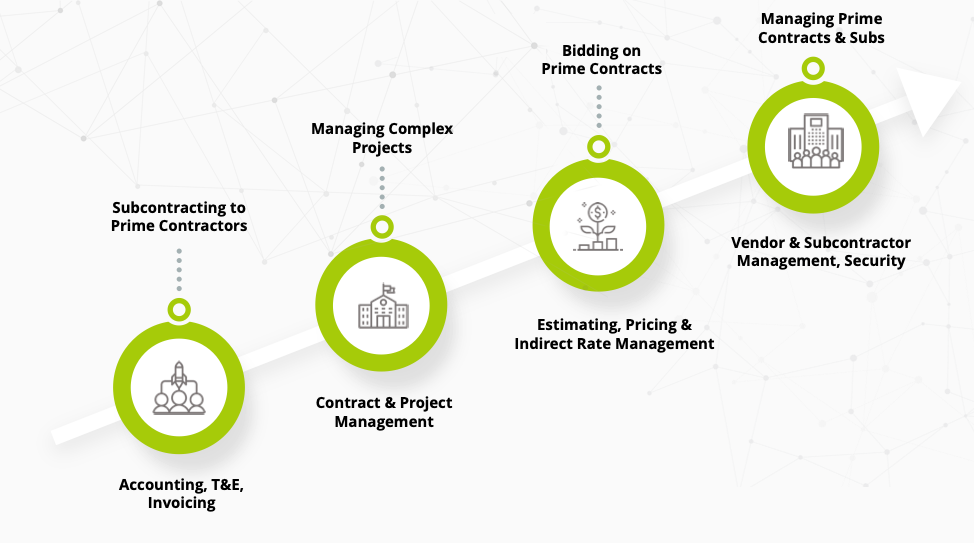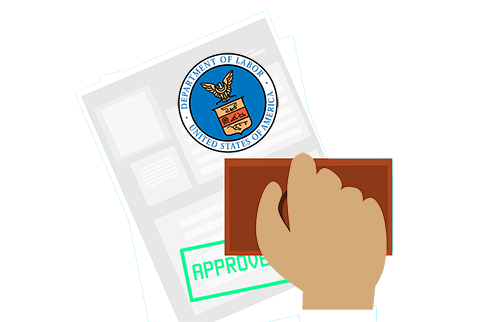- Solutions
- Partners
- Resources
- Blog
- GovCon Source
- GovCon Source Home
- Lean & Agile in the Age of DOGE
- Service Contract Act (SCA)
- DCAA Compliant Accounting
- GovCon Outsourcing & Managed Services
- Government ERP Systems
- Veteran-Owned Small Businesses
- GovCon CyberSecurity
- Graduating 8(a) Program
- SBIRs & Grants
- GovCon Growth Strategies
- GovCon Compliance Audits
- Webinars
- DCAA Compliance
- GovCon Accounting
- Graduating 8(a) Program
- Service Contract Act (SCA)
- GovCon Managed Services
- Government ERP Systems
- GovCon Reviews & Audits
- Cybersecurity Compliance
- Government Grants & Contracts
- Company

GovCon Growth Strategies – Frequently Asked Questions
Understand how to create and implement strategies for growing your government contracting business.
How to Build a Government Contractor's Growth Strategy
Starting and growing a government contracting business requires understanding how to do business with the federal government, implementing back-office processes and systems, handling compliance and audit requirements, successfully managing grants and contracts, and building solid past performance. If you plan on growing by acquiring existing government contractor(s) then you'll need to develop an acquisition strategy as well. Knowing what questions to ask, developing a plan, and implementing a well thought through growth strategy can make all the difference between success and failure. In this post, we provide answers to frequently asked questions (FAQs) on how to grow your GovCon business from a start-up to a prime contractor. We provide key questions to help you develop a growth strategy, including, things you should consider before starting your business, as well as tips on how to do business with the federal government, what back-office capabilities you'll need to build, how to prepare for and handle compliance and audit requirements, and how to develop solid past performance. And finally, we provide questions to help will developing and implementing an acquisition strategy. These tips can help you avoid pitfalls that can derail your growth.
OneLynk: Start with a DCAA-Compliant Platform
The GovCon Journey from Startup to Prime Contractors
As the diagram illustrates, starting and growing a government contracting business requires building capabilities in a wide range of areas. Becoming a prime contractor, requires developing and implementing a long-term growth strategy. This requires time, money, and putting in place the right people. During your journey, you'll need to make critical decisions that determine the processes and systems that you put in place that control how you do business development, manage contracts, and control how you will consistently deliver high-quality past performance. You'll also need to build a team of professionals with expertise in accounting, procurement, contract, and project management that can address all the unique compliance and audit requirements that are required as a government contractor.

Most government contractors address these requirements by following a similar pattern. They start as a subcontractor and as they grow, they implement a patchwork of manual processes and siloed solutions which increases their cost and inhibits their ability to grow quickly. Even worse, many often invest too early, in solutions that don't completely fit their needs, or too late in the solutions needed to run their businesses efficiently. Striking the right balance is difficult and getting it right is challenging without a comprehensive strategy. In this series of related blogs, we help you think about and develop the right growth strategy for your business by providing answers to questions you'll need to ask to build a comprehensive strategy. Reviewing the answer to these questions, can help you avoid common pitfalls that can derail your growth. The resulting growth strategy can provide the catalyst to help you grow quickly from a startup to a prime contractor.
What are the key factors to consider when starting a government contracting business?
 Starting a government contracting business can be a challenging process, but with the right planning and execution, it can also be highly rewarding. Here are some key factors to consider when starting a government contracting business:
Starting a government contracting business can be a challenging process, but with the right planning and execution, it can also be highly rewarding. Here are some key factors to consider when starting a government contracting business:
Legal Structure: Choose the right legal structure for your business, whether it's a sole proprietorship, partnership, limited liability company (LLC), or corporation. Consider the potential liability and tax implications of each option.
Registration and Certifications: Register your business with the appropriate government agencies, including the System for Award Management (SAM), which is required for all federal government contractors. Consider obtaining certifications such as Small Business Administration (SBA) 8(a), Women-Owned Small Business (WOSB), and Service-Disabled Veteran-Owned Small Business (SDVOSB). Obtaining the appropriate certifications can give your business a competitive advantage and increase your eligibility for government contracts.
Develop a Solid Business Plan: A business plan is essential for any new business, and it is especially important for government contracting. Your business plan should outline your goals, strategies, and resources for winning and managing government contracts. Develop a solid financial plan that includes startup costs, projected revenues and expenses, cash flow projections, and funding sources. Consider obtaining financing through government programs such as Small Business Innovation Research (SBIR) and Small Business Technology Transfer (STTR).
Build a Strong Network: Networking is essential for success in government contracting. Attend industry events, join government contracting associations, and connect with other businesses and individuals in the industry. This can help you learn about new opportunities and build relationships that can lead to partnerships and collaborations.
Understand the Procurement Process: The government procurement process is complex and can be challenging to navigate. It's important to understand the regulations, requirements, and procedures involved in government contracting. Consider attending training and workshops on the procurement process to increase your knowledge and expertise. Understand the government contracting process, including how to identify and bid on contracts, how to comply with regulations and requirements, and how to manage contracts and deliverables.
Be Prepared for Long Sales Cycles: Winning government contracts can take longer than in the commercial sector. Be prepared for longer sales cycles, and have the resources and financial backing to sustain your business during this time. Conduct thorough market research to identify potential government customers, understand their needs, and develop a strategy for reaching them. Identify your unique value proposition and develop a marketing plan to differentiate your business from competitors.
Team Building: Build a strong team with experience and expertise in government contracting, including business development, proposal writing, contract management, and compliance. Consider partnering with other businesses to enhance your capabilities and competitive advantage.
Focus on customer service: Government agencies value businesses that provide excellent customer service. Focus on delivering high-quality services and products and building strong relationships with your customers that will results in excellent past performance.
Emphasize compliance: Government contracts come with strict compliance requirements. Emphasize compliance in all aspects of your business, including accounting, recordkeeping, and quality control.
By considering these key factors, you can set your government contracting business up for success and growth in the long term.
Learn More about Starting Your GovCon Business: Key Questions When Starting a GovCon Business
Why is learning how to do business development with the federal government so important to growing a government contracting business?
Business development is essential for growing any type of business, including government contracting businesses. Here are several reasons why:
Finding new business opportunities:Government contracting businesses need to continually find new opportunities to bid on contracts. Business development involves researching and identifying potential opportunities, establishing relationships with government agencies, and positioning the company to win the contracts.
Building relationships: Business development is about building relationships with government agencies, potential teaming partners, and other contractors. These relationships can lead to more business opportunities and help position the company for long-term success.
Strategic planning: Business development requires a strategic approach to identify and pursue opportunities that align with the company's strengths and capabilities. This can help the company focus its resources and efforts on the most promising opportunities and maximize its chances of success.
Competitive advantage: A strong business development strategy can give a government contracting business a competitive advantage over other companies bidding on the same contracts. By positioning the company as a preferred partner, it can increase its chances of winning contracts and growing its business.
Revenue growth: Ultimately, business development is about driving revenue growth. By identifying and pursuing new business opportunities, building relationships, and focusing on strategic planning, a government contracting business can increase its revenue and achieve long-term success.
Learn More about Working with the Federal Government: Doing Business with the Federal Government
What systems are required by a prime government contractor?
 Prime government contractors are typically required to implement a range of systems and processes to ensure compliance with government regulations and requirements, and to manage their contracts effectively. Some of the key systems that may be required by prime government contractors include:
Prime government contractors are typically required to implement a range of systems and processes to ensure compliance with government regulations and requirements, and to manage their contracts effectively. Some of the key systems that may be required by prime government contractors include:
Accounting System: A compliant accounting system is essential for prime government contractors, as it is the basis for tracking and reporting costs associated with government contracts. The system must be capable of generating accurate and reliable financial statements and be designed to comply with government cost accounting standards.
Human Resource and Payroll System: Prime government contractors are required to maintain accurate and complete records of employees working on government contracts and their and payroll history. A human resource and payroll system must be able to maintain employee personnel related information and payroll history including employee's salary history, benefits, training records, as well as track employee payroll data.
Timekeeping System: Prime government contractors are required to maintain accurate and complete records of employee time and attendance for government contracts. A timekeeping system must be able to track employee time by job, contract, and task, and comply with government regulations related to timekeeping.
Estimating System: Government contractors are required to provide accurate and reliable cost estimates when bidding on government contracts. A compliant estimating system must be able to generate accurate cost estimates and comply with government regulations related to estimating.
Purchasing System: Government contractors are required to have a purchasing system that ensures compliance with government regulations related to purchasing and subcontracting. A compliant purchasing system must be able to generate purchase orders, maintain accurate records of vendor payments, and comply with government regulations related to procurement.
Property Management System: Prime government contractors are required to maintain accurate records of all government property in their possession or control. A compliant property management system must be able to track government property, ensure that it is properly maintained, and comply with government regulations related to property management.
Project Management System: A project management system is essential for prime government contractors, as it is the basis for managing and monitoring projects. A compliant project management system must be able to track manage a work breakdown, generate required job cost reports, and integrate with the accounting and payroll systems to support complying with government audit requirements.
Contract Management System: A contract management system is essential for prime government contractors, as it is the basis for managing and monitoring government contracts. A compliant contract management system must be able to track contract requirements, generate required reports, and comply with government regulations related to contract management.
Overall, prime government contractors are required to implement a range of systems and processes to ensure compliance with government regulations and requirements, and to manage their contracts effectively. The specific systems required may vary depending on the contractor's size, scope of operations, and the types of government contracts they are working on.
Learn More about Staying Compliant: DCAA Compliant Systems
What are the compliance and audit requirements for a prime government contractor?
The compliance and audit requirements for government contractors can vary depending on the type of contract, agency, and the nature of the work being performed. However, here is a list of some common compliance and audit requirements that government contractors may be subject to:
FAR and DFARS compliance: Federal Acquisition Regulations (FAR) and Defense Federal Acquisition Regulations Supplement (DFARS) are a set of rules that govern the federal procurement process. Government contractors are required to comply with these regulations when performing work under federal contracts.
Cost Accounting Standards (CAS): CAS is a set of accounting standards and rules that apply to the measurement, assignment, and allocation of costs to government contracts. Contractors who receive certain types of government contracts or grants may be subject to CAS.
Government Property: Government contractors may be required to manage and account for government-owned property used in the performance of the contract. This includes property such as equipment, vehicles, and materials.
Security Clearances: Depending on the nature of the work being performed, government contractors may be required to obtain security clearances for employees who will have access to sensitive or classified information.
Cybersecurity: Government contractors may be required to comply with various cybersecurity regulations and standards, such as NIST SP 800-171, to protect sensitive information and systems from cyber threats.
Small Business Participation: Some government contracts require participation from small businesses, and contractors may be required to report on their compliance with small business subcontracting goals.
Audit Requirements: Government contractors may be subject to various types of audits, including financial audits, compliance audits, and performance audits. These audits are typically conducted by the Defense Contract Audit Agency (DCAA) or other government audit organizations.
In summary, government contractors are subject to a range of compliance and audit requirements, including FAR and DFARS compliance, cost accounting standards, government property management, security clearances, cybersecurity, small business participation, and audits. Contractors should carefully review the requirements for each contract they bid on and ensure they have the necessary systems and processes in place to comply with these regulations.
Learn More about Requiremnts for Compliance and Audits: Compliance and Audit Requirements for Government Contractors
What government contract types are used by the government when purchasing supplies and services?
There are four primary types of government contracts, and the difference between them can be significant. Each requires a unique approach to bidding, and a unique approach to performing the work, as well as what you'll need to track to be profitable. Understanding the distinct challenges and opportunities of each contract is important for every business in selling to the government if that business is to succeed as a government contractor. When selecting a contract type, each government agency examines its requirements, analyzes its financial and performance risks, and develops an acquisition strategy that determines the appropriate contract type to meet the government's needs. Contract types fall into four main categories:
- Fixed price contracts
- Cost-reimbursable contracts
- Time and material contracts
- Infinite delivery/indefinite quantity (IDIQ) contracts
Learn More about Government Contract Types: Major Government Contract Types - What You Need to Know
What contract and project management software does a government contractor need to successfully manage grants and contracts?
Government contracts contain many terms, conditions and requirements that must be followed by contractors, if they are going to be managed profitably and generate great past performance. Government contractors must put in place contract and project management software and processes to help them track a steady flow of contract modifications, track and manage contract cost and deliverables, generate accurate and timely job cost reports and handle government funding correctly, including generating accurate and timely invoices.
Learn More about Contract Management Software: Contract Management Software for Government Contractors
Learn More about Project Management Software: Project Management Software for Government Contractors
Why is past performance so important to winning government contracts?
 Past performance is critical for winning government contracts because government agencies want to work with contractors who have a proven track record of delivering high-quality products and services on time and within budget. Here are several reasons why past performance is so important:
Past performance is critical for winning government contracts because government agencies want to work with contractors who have a proven track record of delivering high-quality products and services on time and within budget. Here are several reasons why past performance is so important:
Demonstrates Capability and Reliability: Past performance provides evidence that a contractor has the capability and reliability to deliver the products or services required by the government agency. A contractor with a strong past performance record can demonstrate to the government agency that they have the necessary experience, skills, and resources to complete the project successfully.
Builds Trust and Confidence: A contractor with a proven track record of success builds trust and confidence with the government agency. By demonstrating that they have successfully completed similar projects in the past, the contractor can instill confidence in the government agency that they can complete the current project on time, within budget, and to the required specifications.
Increases Competitive Advantage: Contractors with strong past performance records are more likely to win contracts than those without. Past performance is often one of the evaluation criteria used by government agencies to select contractors, and a strong record can give a contractor a competitive advantage over other bidders.
Provides References and Testimonials: Past performance provides an opportunity for contractors to gather references and testimonials from previous government agencies, which can be used to demonstrate their capabilities to future government agencies. These references and testimonials can help build trust and confidence with new customers.
In summary, past performance is crucial to winning government contracts because it demonstrates capability and reliability, builds trust and confidence, increases competitive advantage, and provides references and testimonials. Government agencies want to work with contractors who have a proven track record of success and can deliver high-quality products and services on time and within budget, and past performance is the best way to demonstrate this.
Learn More about Past Performance: Government Contractor Tips on Managing Past Performance
What key factors should be considered when acquiring a government contracting business?
Acquiring a government contracting business can be a complex process that requires careful consideration of a range of factors. Some key factors that should be considered when acquiring a government contracting business include:
Contract Status: The status of the government contracts held by the target company is a critical factor in any acquisition. It is important to review the contracts to determine their value, duration, and any potential issues, such as contract compliance, performance issues, and potential disputes.
Financial Performance: A thorough review of the target company's financial statements is essential to evaluate the company's financial health and potential risks. This includes reviewing income statements, balance sheets, cash flow statements, and other financial metrics to determine the company's profitability, liquidity, and financial stability.
Regulatory Compliance: Government contractors are subject to a range of regulations and requirements, and it is essential to evaluate the target company's compliance with these regulations. This includes reviewing any past performance issues, regulatory violations, and pending legal disputes.
Human Capital: The skills and expertise of the target company's employees are a critical factor in the success of the acquisition. It is important to evaluate the company's workforce, including the skills and experience of key personnel, their compensation structures, and any potential retention risks.
Synergies and Integration: The potential synergies and integration opportunities between the acquiring company and the target company should also be considered. This includes evaluating the compatibility of the two companies' cultures, systems, and processes, and identifying any potential cost savings or operational efficiencies.
Market Position: The target company's market position and competitive environment should also be evaluated. This includes reviewing the company's customer base, market share, competitive landscape, and any potential growth opportunities.
Overall, the key factors that should be considered when acquiring a government contracting business are the contract status, financial performance, regulatory compliance, human capital, synergies and integration, and market position of the target company. By carefully evaluating these factors, acquirers can make informed decisions and ensure a successful acquisition.
Learn More Acquisition Strategy: Government Contractor Tips on Building an Acquisition Strategy
Learn More About AtWork Systems
AtWork Systems is an Arlington, Virginia based managed services and software development company. Its principals have decades of experience doing business with and working for federal, state, and local government. They developed OneLynk as a configurable and scalable SaaS platform that digitizes and optimizes processes while providing just in time business intelligence for decision making. OneLynk contains a suite of easily configurable web applications for automating and monitoring business transactions, including: human capital management, accounting, timekeeping, expense management, procurement, contracts and project management, payroll services and more. Discover the latest ERP System for Government Contractors at www.atworksys.com.
Ready for the Next Step?
Find out if AtWork’s integrated software suite and helpful team of GovCon experts can assist you. With more than a century of combined experience in government contracting, our team wants to hear from you.
